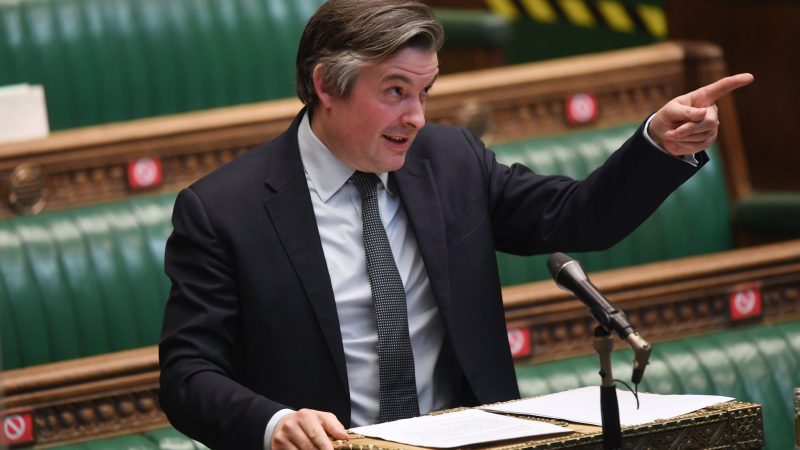
Jonathan Ashworth has said the spread of the Indian variant in the UK could have been avoided while telling Matt Hancock that the government’s policy on the border throughout the pandemic had made them “about as secure as a sieve”.
Addressing parliament following a statement on the government’s response to the virus from Hancock this afternoon, the Shadow Health Secretary described the delay in adding India to the red list as a “catastrophic misstep”.
He highlighted comments from Anthony Harden of the joint committee on vaccination and immunisation, that vaccines would be less effective at reducing its transmission, and called for a plan to contain it.
“I entirely appreciate that when questioned he won’t be able to give a cast-iron assurance about opening up on June 21st, and I’m not going to try and push him into a corner,” he told MPs. “But we do need a plan now to contain this variant.”
Ashworth told the Health Secretary this afternoon that he should consider other measures for suppressing the new strain before enforcing local restrictions, describing the approach as a “mallet to try and whack moles”.
He asked the minister to start surge vaccination in all hotspot areas, introduce proper sick pay and “decent isolation support”, as well as to work with businesses on ventilation and the NHS to prepare for a surge in cases.
Hancock used his statement to update parliament on the government response to Covid variants of concern, in particular the spread of the B1617.2 or the ‘Indian variant’ in the UK, of which there have now been 2,323 confirmed cases.
He explained that 483 of these cases have been found in Blackburn and Bolton. He said there are eight people in hospital with Covid in Blackburn and 19 people in Bolton, the majority of whom are eligible for but have not taken the jab.
“This shows the new variant is not tending to penetrate into older, vaccinated groups and it underlines again the importance of getting the jab especially, but not only, amongst the vulnerable age groups,” Hancock told MPs.
The government has deployed a rapid response team of 100 people into the two most affected areas, who have visited around 35,000 people to distribute and collect tests, employed new vaccinators and installed new Covid vaccination centres.
“The early evidence suggests that B1617.2 is more transmissible than the previously dominant 1117 variant,” Hancock told MPs. “We do not yet know to what extent it’s more transmissible. And while we also don’t have the complete picture on the impact of the vaccine, the early laboratory data from Oxford University corroborates the provisional evidence from Bolton hospital and the initial observational data from India that vaccines are effective against this variant.”
Ashworth also criticised the decision to cut government aid spending during the global health crisis and told MPs that the spread of the B1617.2 variant in the UK is a reminder that “we are not safe until everyone is safe”.
“That is not a slogan, it’s a fact. 3.3 million lives have been lost globally by this virus,” he said. “Only 0.3% of vaccine supply is going to low income countries. Trickle-down vaccination is not an effective strategy for fighting this deadly virus.
“Not only do we have a moral responsibility to play our part internationally, it also reduces the risk of new variants bouncing back at us and setting us back.
“So at this critical time, when we need to work internationally to defeat this virus, why are we the only G7 nation cutting our aid budget? How can he defend cutting our contribution to vital science and research projects?”
The UK government announced last year that it would be cutting its aid spending from the previously legally binding commitment of 0.7% of gross national income target to 0.5%, representing a reduction of more than £4bn.
Labour argued at the time that the move would “damage the UK’s reputation around the world”. 187 charities and aid organisations wrote to the Prime Minister calling for the government to reverse its decision.
Ashworth today condemned the government’s silence over the temporary lifting of patent protections on vaccines after Joe Biden came out in support of the campaign earlier this month, asking whether the UK agrees with the US.
Hancock told parliament that the UK has done “more than any other nation” by delivering the Oxford-AstraZeneca vaccine globally, saying that “we have taken nothing for the money that we’ve put for the development of this”.
The US President announced earlier this month his support for a patent waiver on Covid jabs to boost production and distribution around the world. The move requires the agreement of the World Trade Organisation to take effect.
The decision from Biden’s administration followed longer-standing support from other countries including India and South Africa since October last year. Resistance from many European countries to lifting patent protections remains.
Head of the panel reviewing the World Health Organisation’s handling of Covid Helen Clark has called on those blocking the temporary suspension of intellectual property rights, such as Switzerland and the UK, to follow the US lead.




More from LabourList
Sadiq Khan signals he will stand for a fourth term as London Mayor
Starmer or Sarwar: Scottish Labour MSPs and MPs split over Keir Starmer’s future
‘Every Lidl helps: What can the Government do to bring down food prices?’